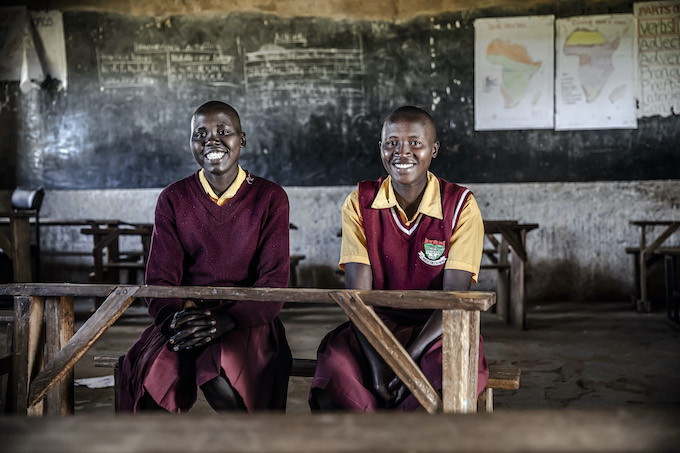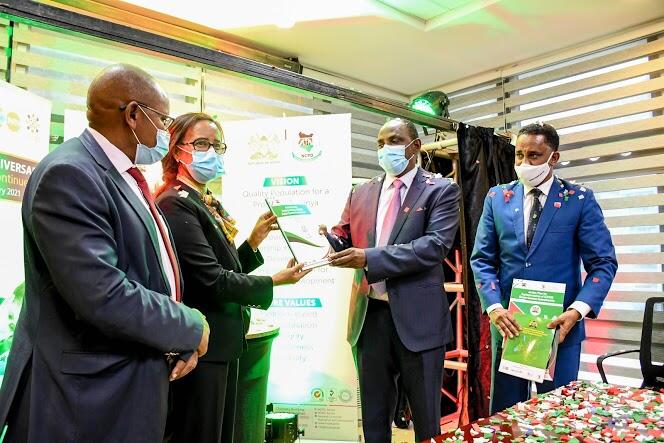NAIROBI, Kenya, 28th January 2021- In November 2019, Kenya played host to over 8,000 delegates from 173 countries who gathered in Nairobi to recommit to the goals set forth at the International Conference on Population and Development (ICPD), 25 years after the first conference declared reproductive and sexual health as a fundamental right and affirmed the need to empower women and girls everywhere.
The Nairobi Summit on ICPD25 was co-hosted by the government of Denmark and UNFPA, and resulted in some 1,300 commitments in support of sexual and reproductive health and rights. Kenya made 17 commitments that included pledges on improving access to sexual and reproductive health services, universal education, promoting gender equity, harnessing the demographic dividend, and financing for population programmes.
At a meeting to take stock of progress made in the realization of these commitments, government officials in the Ministries of Health, Gender, Education, ICT, Labour & Social Protection, and Public Service shared the achievements and work done by government and implementing partners over the last year. The event was presided over by Amb. Ukur Yatani, the Cabinet Secretary, National Treasury and Planning, who was joined by Dr. Medhin Tsehaiu UN Resident Coordinator ad interim, in launching the 2019/2020 Annual Report on the Implementation of Kenya Country Commitments. “By successfully hosting the Nairobi Summit on ICPD25, Kenya must lead the way in implementing her part of the commitments made. In doing so, Kenya will become the reference point for ICPD25 in the same manner that Cairo was the reference point for the first Global Conference on Population and Development,” said Amb. Yatani.
The report shows that despite challenges brought about by the Covid-19 pandemic, efforts towards eliminating preventable maternal and newborn morbidity and mortality continued over the last year with the training of over 17,000 health care workers on Emergency Obstetric and Neonatal Care (EmONC), provision of family planning services, obstetric fistula care, among other maternal and neonatal health issues. Over the course of the year, Kshs 4 billion was allocated to the National Hospital Insurance Fund (NHIF) for the Linda Mama program which provides health insurance for maternal and child healthcare services.
By successfully hosting the Nairobi Summit on ICPD25, Kenya must lead the way in implementing her part of the commitments made. In doing so, Kenya will become the reference point for ICPD25 in the same manner that Cairo was the reference point for the first Global Conference on Population and Development.
Ag. UN Resident Coordinator Dr. Medhin Tsehaiu said the UN remains committed to supporting government efforts aimed at helping Kenya's health sector build back better from the pandemic.
"In collaboration with the Ministry of Health, UNFPA has continued to provide Family Planning commodities to eliminate the unmet need for family planning as well as support on the provision of maternal health services that are key in eliminating preventable deaths," she noted.
In addressing social and economic challenges faced by the youth, key milestones were recorded over the last year, including the establishment of a multi-agency task force to end teenage pregnancies in the country, as well as improved access to health services for adolescents and youth. The report shows that close to half a million adolescents have been linked to healthcare services within their localities, including access to health services for survivors of sexual and gender based violence.
“The Ministry of Education has established school re-entry guidelines to make sure no student is left behind due to teenage and early pregnancy. We have been able to provide 1.6 M girls with sanitary pads, and these efforts have gone a long way in ensuring that girls remain in school and complete their education,” shared the Principal Secretary in the Ministry of Education, Dr. Richard Belio Kipsang.

The youth also received support in the development of job skills through programmes such as the Kenya Youth Employment Opportunity Project (KYEOP) and the National Youth Service (NYS). Over 50,000 young people received apprenticeship and industrial skills training as well as coaching on entrepreneurship in both the formal and informal sectors. Over Kshs 473.3 million in credit was disbursed to youth and youth enterprises, benefitting about 94,680 youth from various parts of the country.
The Ministry of Education has established school re-entry guidelines to make sure no student is left behind due to teenage and early pregnancy.
The Covid-19 pandemic and the resulting economic challenges and restrictions in movement have worsened existing gender inequalities in the country. This has been evidenced by a spike in the number of women and girls experiencing gender-based violence during this period. Providing support to women and girls affected by gender based violence and other harmful practices such as FGM and child marriages has been a key focus, with efforts to increase access to quality and comprehensive response and support services to survivors of gender based violence.
Amongst the 17 commitments made by the government of Kenya at the Nairobi Summit on ICPD25 was the elimination of female genital mutilation (FGM) in Kenya by 2022, ahead of the global target of 2030. With the support of partners including the United Nations Population Fund (UNFPA), the government through a multi-stakeholder approach has made progress on this commitment, including the training of over 4,000 law enforcement officers and community leaders on FGM prevention.
Drawing from lessons learnt over the past year, the report recommends the integration of emergency response and risk mitigation plans in the design of programs for adolescents and youth, whose wellbeing has been significantly impacted during the Covid-19 pandemic.


